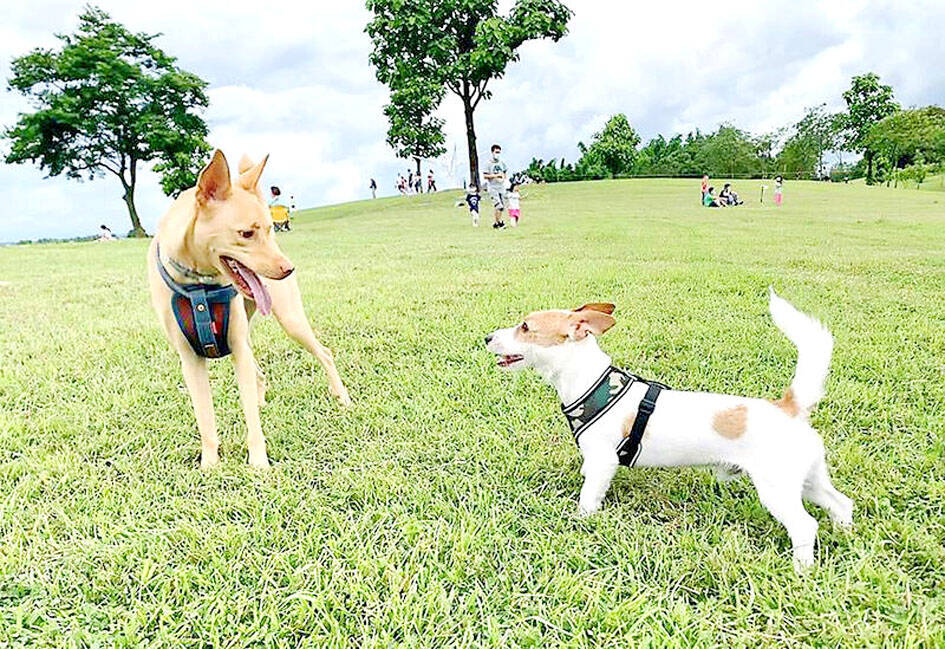Pet owners should take their pets to have periodic physical checkups, as cats and dogs aged seven or older could easily get fatal heart diseases, the New Taipei City Animal Protection and Health Inspection Office said.
The office cited Ruifang Animal Shelter veterinarian Wang Yan-hsu (王嚴?) as saying that prevention trumps cure, urging pet owners to periodically bring young cats and dogs to veterinary hospitals for congenital heart defect screening tests and physical examinations.
Dogs’ diets should consist of good proteins, omega-3 fatty acids, vegetables and fruit, based on the low-sodium, nutritional balance principle, he said.

Photo courtesy of the Siraya National Scenic Area Administration
Cats should be fed with whole foods containing taurine, which is abundant in chicken, pork liver and tuna, L-carnitine — mostly found in beef and fish — fish oil and coenzyme Q10, Wang said.
To reduce cardiac stress for pets, owners must control their pets’ body weight and avoid intensive exercise or emotional stress, he was quoted as saying.
Pet owners should also keep a clean living environment by removing standing water to minimize the risk of pets contracting heartworm disease transmitted by mosquitoes, Wang said.
Research showed that 50 to 60 percent of stray dogs and 30 percent of house dogs in Taiwan are infected with heartworm disease, the office said.
Heartworm infection would result in right ventricular hypertrophy, valvular diseases, and pulmonary endarteritis or embolism in cats or dogs, seriously affecting their cardiac health, the office quoted Wang as saying.
The treatment of heartworm disease usually includes medications, antithrombotic agents and sometimes taurine supplements to prevent fatal heart diseases, the office said.
The incidence rates of chronic diseases in pets have increased, as they live longer nowadays, so pet owners should arrange regular checkups for them, it said.
Pets with heart disease can live happily and normally as long as their owners follow the vet’s instructions and make periodic appointments, it said, adding that people should not abandon pets that have poor health.

SHIPS, TRAINS AND AUTOMOBILES: The ministry has announced changes to varied transportation industries taking effect soon, with a number of effects for passengers Beginning next month, the post office is canceling signature upon delivery and written inquiry services for international registered small packets in accordance with the new policy of the Universal Postal Union, the Ministry of Transportation and Communications said yesterday. The new policy does not apply to packets that are to be delivered to China, the ministry said. Senders of international registered small packets would receive a NT$10 rebate on postage if the packets are sent from Jan. 1 to March 31, it added. The ministry said that three other policies are also scheduled to take effect next month. International cruise ship operators

NUMBERS IMBALANCE: More than 4 million Taiwanese have visited China this year, while only about half a million Chinese have visited here Beijing has yet to respond to Taiwan’s requests for negotiation over matters related to the recovery of cross-strait tourism, the Tourism Administration said yesterday. Taiwan’s tourism authority issued the statement after Chinese-language daily the China Times reported yesterday that the government’s policy of banning group tours to China does not stop Taiwanese from visiting the country. As of October, more than 4.2 million had traveled to China this year, exceeding last year. Beijing estimated the number of Taiwanese tourists in China could reach 4.5 million this year. By contrast, only 500,000 Chinese tourists are expected in Taiwan, the report said. The report

The Forestry and Nature Conservation Agency yesterday launched a gift box to market honey “certified by a Formosan black bear” in appreciation of a beekeeper’s amicable interaction with a honey-thieving bear. Beekeeper Chih Ming-chen (池明鎮) in January inspected his bee farm in Hualien County’s Jhuosi Township (卓溪) and found that more than 20 beehives had been destroyed and many hives were eaten, with bear droppings and paw prints near the destroyed hives, the agency said. Chih returned to the farm to move the remaining beehives away that evening when he encountered a Formosan black bear only 20m away, the agency said. The bear

Chinese embassy staffers attempted to interrupt an award ceremony of an international tea competition in France when the organizer introduced Taiwan and displayed the Republic of China flag, a Taiwanese tea farmer said in an interview published today. Hsieh Chung-lin (謝忠霖), chief executive of Juxin Tea Factory from Taichung's Lishan (梨山) area, on Dec. 2 attended the Teas of the World International Contest held at the Peruvian embassy in Paris. Hsieh was awarded a special prize for his Huagang Snow Source Tea by the nonprofit Agency for the Valorization of Agricultural Products (AVPA). During the ceremony, two Chinese embassy staffers in attendance